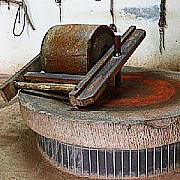I'm reading the Andrzej Kalisz's forum. He is a Yao Cheng Guang student.
http://www.yiquan-training.com/viewtopic.php?t=11
What you say is clear, but I have one question : does "no need to talk about Qi" mean "maybe something like Qi exists but we don't take care of it in Yiquan" or does it mean "in Yiquan we believe Qi does not exist" ?
In other words, what was WXZ's opinion on Qi?
He said in "interwiew" : "within the abdomen there are the intestines, the stomach, the liver, there is no place to fill with the qi" and "as for the theory of the dantian qi, from the theorical point of wiew, field tests, and my own perception from experience and observations, this theory does not seem proper".
So, it seems it is not "in yiquan, we are not concerned with the old stuff of qi, meridians, etc..., maybe it is good for qigong things but we don't use it" : it is rather "in yiquan we believe qi doesn't exist" What do you think ?
His reply is quite interesting for me:
"....For me qi is a traditional chinese concept used to describe and explain various phenomena. And this concept itself has many meanings, depending in which field we are using it.....
can say to student: "Now you imagine, your head is as if supporting the ceiling, and your hips area is as if 'falling down', as if you were to sit down, you feel that your body is straightened, you are like a straight, springy bamboo, although your head is 'leading upward', you are not uprooted, because the 'hips are falling down' help you to 'root', so you have the upward and downward forces properly balanced". Now I can add, that when I was talking about 'feeling of sitting down', I could explain that in more classical way it would be said about 'qi sinking to dantian'. And when I was talking about balance of upward and downward forces it would be said "yang qi rising, and yin qi sinking". No problem for me, because I know what I would be talking about, and I could use such words, or other words. When talking about qi this way, I wouldn't think about "mysterious energy" and wouldn't wonder if this kind of energy exists or not, or if I believe in it or not. Because I know what I'm ACTUALLY talking about, how it relates to efficient use of body, to the fast but at the same time stable steps etc. But if I would say the word qi, the student would start thinking of some specific kind of energy, like gravitation, electromagnetic, and on top of this one more - qi. And then he would start believing it or not believing it. ..."
The basic idea is that Wang Xiang Zhai in his last book ("Theory of Dacheng Quan") said that the concept of Qi and his accumulation in Dantian is misleading and un-useful for the development of martial skills.
In the famous interview to WXZ I read the following.
Interviewer: "I have heard many martial artists saying: "If you do not use strength, how can you increase it? None of the ancient and modern masters neglected the enriching of the dantian qi, and only because of that, could they be successful."
Wang Xiangzhai: "The theory of using strength is the talk of laymen. There are also those who speciously support the theory of not using strength, but do not know what it means after all. One must know that not to use strength is correct, but not to use the mind is incorrect. If one uses strength then the internal organs die, the body becomes ineffective, stiff, stupid, and easy to be taken advantage of by others. In other words, it is just a disguised form of passive resistance. The idea of resisting is produced by the fear of being hit by the adversary, but in this way one is completely ignorant of the fact that the spirit has already accepted to be hit. How could one then not get hit by the adversary?
Therefore, using strength is a great taboo in combat science. As for the theory of the dantian qi, from the theoretical point of view, field tests, and my own perception from experience and observation, this theory does not seem proper. Within the abdomen there are the intestines, the stomach, and the liver, there is no place to fill with the qi. As for the functions of force, they are all effects of the opposite power, the explosive power, and the power of the universe combined, and exerted together with breath that makes the body bulge and undulate, open and close, and the body and spirit being integrated with the atmosphere in one's mind.
That has nothing to do with what the people call the qi of qigong. They always take a potbelly as dantian qi, that is just extremely wrong. One must know that when exerted, the strength must be issued evenly and completely. In order to be entirely free from worry and to gain strength, one should also be at leisure and natural, that is just being reasonable. The students of modern times do not understand this truth, they spend dozens of years working hard, and instead of gaining lively bodies and minds from the training, they become machines. Is that not a great pity!"
Similar concepts are expressed here:
http://www.martialtaichi.co.uk/articles/qi_free.php
by Joanna Zorya
What I'm trying to understand is if the development of martial skills requires that one tries to "open the small heavenly circle" and meridians.
Or if it's a waste of time.
Sorry for the long post.

What do you think?
Neijin.











 Please say you're weren't serious?
Please say you're weren't serious?